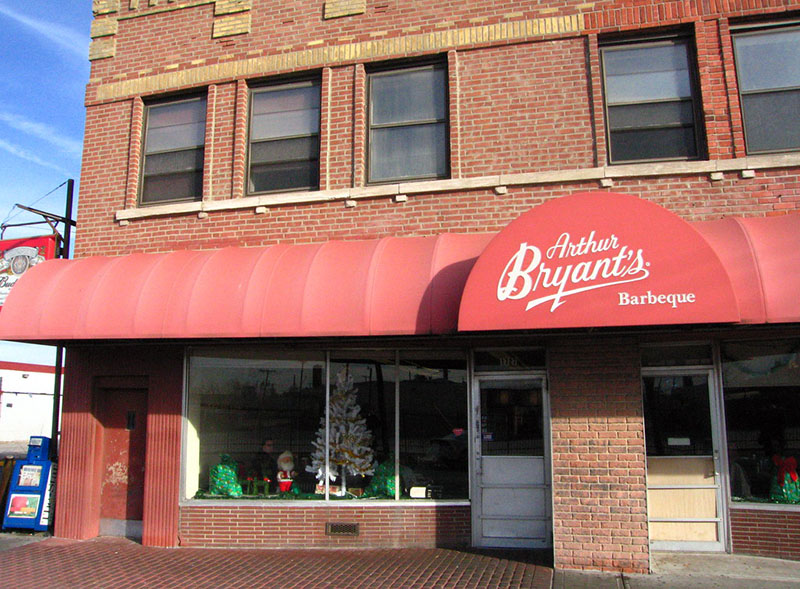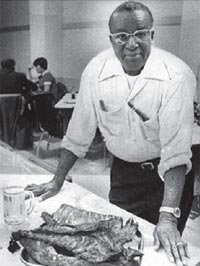Arthur Bryant died on December 28, 1982, while working in the restaurant that he turned into a world-famous barbecue joint. Bryant was born in 1902 in Branchville, Texas, and attended Prairie View A&M, an all-black agricultural college. After declining to teach agricultural classes, he moved to Kansas City in 1931 to join his brother, Charlie, who worked for local barbecue magnate Henry Perry.
Perry, who worked on steamboat kitchens along the Mississippi River around 1900, brought his knowledge of southern barbecue with him to Kansas City in 1907. In the city’s thriving Garment District downtown, he served smoked meats, with a pungent pepper sauce, from alley stands, a barn, and finally a restaurant to blacks and whites alike. When Perry died in 1940, Charlie Bryant took over the business and then sold it to Arthur Bryant in 1946. Today Perry is best remembered as the "father" of Kansas City-style barbecue and an early business leader in the black community.
When Arthur Bryant inherited the business, it was respected but not exactly a local legend. Arthur Bryant toned down the barbecue sauce to have wider appeal and renamed the business "Arthur Bryant’s." In 1958 he moved it to 1727 Brooklyn Avenue, near Municipal Stadium, where he lovingly referred to the unassuming joint as a "grease house." The distasteful nickname hardly kept the diners away though. Presidents Harry Truman and Jimmy Carter dined there; as did journalist Calvin Trillin, who wrote in 1974 that Arthur Bryant’s was "quite possibly the best restaurant in the world."

On a routine work day in 1982, Bryant succumbed to a heart attack in a rest area of the restaurant. Under new ownership, Arthur Bryant’s continues to serve the same famous recipes that helped make Kansas City-style barbecue nationally renowned. Barbecue did not originate in Kansas City, but the city has embraced barbecue to an inordinate degree and is widely considered the barbecue capital of the world. The area hosts more than 90 barbecue restaurants as well as the Kansas City Barbecue Society, a non-profit organization that claims 8,000 members, and annually sanctions 300 barbecue contests across the nation.
Read full biographical sketches of Arthur Bryant and Henry Perry, prepared by the Missouri Valley Special Collections, The Kansas City Public Library.
- Biography of Arthur Bryant (1902-1982), Restaurateur, by David Conrads, 2003.
- Biography of Henry Perry (1875-1940), Restaurateur, by Daniel Coleman, 2005.
View images of Kansas City barbecue that are a part of the Missouri Valley Special Collections.
Check out the following books about Kansas City barbecue and Arthur Bryant.
- Smokestack Lightning: Adventures in the Heart of Barbecue Country, by Elie Lolis; chapter nine discusses the history of Kansas City barbecue, pp. 140-153.
- The Grand Barbecue: A Celebration of the History, Places, Personalities and Technique of Kansas City Barbecue, by Doug Worgul.
- Wild about Kansas City Barbecue, by Rich Davis.
- Take Up the Black Man's Burden; Kansas City's African American Communities, 1865-1939, by Charles Coulter; contains biographical sketches about Henry Perry and other African American leaders in Kansas City, pp. 120-121.
- The Tummy Trilogy: American Fried—Alice, Let's Eat—Third Helpings, by Calvin Trillin; explores the culinary delights of America and reiterates Trillin’s love of Arthur Bryant’s.
View "Cooking Barbecue Kansas City Style," videocassette, by Charlie Podrebarac; instructions on Kansas City-style barbecue.
Continue researching Kansas City barbecue history using archival material from the Missouri Valley Special Collections.
- Ramos Vertical File: Biography A-E, Charles Bryant, Ramos Collection.
- Interview with Ollie W. Gates, son of George Gates and later the owner of Gates & Sons barbecue. George Gates and Arthur Pinkard opened the restaurant in 1946 using recipes learned from Henry Perry.
- Vertical File: Gates, Ollie.
- "American Fried: Adventures of a Happy Eater," in The New Republic, September 13, 1975; one of Calvin Trillin’s articles about great restaurants in Kansas City, including Arthur Bryant’s.
References:
Lawrence O. Christensen, Dictionary of Missouri Biography (Columbia, MO: University of Missouri Press, 1999), 131.
Daniel Coleman, Biography of Henry Perry (1875-1940), Restaurateur, Missouri Valley Special Collections.
David Conrads, Biography of Arthur Bryant (1902-1982), Restaurateur, Missouri Valley Special Collections.
Charles Coulter, Take Up the Black Man's Burden: Kansas City's African American Communities, 1865-1939 (Columbia: University of Missouri Press, 2006), 120-121.
Rick Montgomery & Shirl Kasper, Kansas City: An American Story (Kansas City, MO: Kansas City Star Books, 1999), 346.


